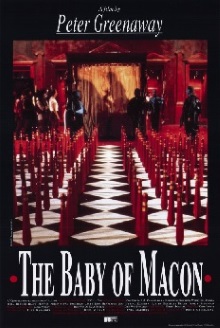
This was a recommendation from our cinephile friend and I only realized later that it was directed by Peter Greenaway whose wonderfully named The Cook, the Thief, His Wife & Her Lover is very famous and something I’ve always meant to watch. Though the title for this film is less impressive, it’s still a very odd work that is very hard to classify, skirting as it does between being a stage play that is captured on film and a film that is about a stage play being performed for an audience.
A grotesque character who is presumably the Devil states that the town of Mâcon is cursed by famine, sickness and barren women. That is until a golden-haired baby is born to an old, ugly woman and a husband who peddles fake cures. Given the unlikelihood of such an imperfect couple giving birth to such a perfect baby, the child’s elder sister immediately claims him for her own, telling everyone that it was a virgin birth. The townsfolk hail the baby as something of a Messiah and the daughter profits by selling the baby’s blessings for goods and favors. The church is jealous and the bishop’s son in particular plays the part of the skeptic, attributing the ending of the town’s curse to be a coincidence and questioning whether or not the daughter is truly a virgin. The daughter attempts to get the bishop’s son on her side by offering him her virginity but the child intervenes, causing a bull to gore the son, killing him and giving an excuse for the bishop to seize control over the child.
The whole thing is set up to look like a huge play shown to a vaguely medieval audience and indeed the reactions of the watchers are part of the film. Yet this conceit isn’t always consistent as some sets, such as the cathedral seem too large to exist on stage and the camera is able to follow the performers as they go beneath the stage. The result is an inventive attempt to mix theatre storytelling techniques with the freedom of a camera. Indeed, there are even moments when the performers break character, especially between acts with one funny example being an audience member being so desperate to be given a part that he offers a bribe. Other features include the medieval music and the use of language that emphasizes repetition and a poetic cadence, not to mention an archaic vocabulary that isn’t in common use today. I understand that it may not be to everyone’s tastes but I loved its presentation and style and would probably have enjoyed this film for that alone.
The film’s theme of course is solidly anti-religious, or more precisely against the hypocrisy of organized religion, especially when it comes to selling blessing and sacred relics. That the Bishop has a son at all is I suppose one of the barbs though it is never remarked upon. The selling of blessings and such is bad enough, gets creepy when the church starts selling the child’s tears, blood and urine but is downright macabre towards the end, reminding us that, yes, people did used to keep the body parts of saints as holy relics. The graphic depictions of sex and violence is shocking but I suppose that this is the point and I understand that it’s part of Greenaway’s signature. Juxtaposed with the darkly comedic tone, the sumptuousness of the costumes and how all this is supposed to be entertainment to an audience who is clearly delighted with the spectacle, it makes for an especially unsettling watch but also a very memorable one.
Personally I love this film’s originality and wit, plus there’s the fact that I’ve been a skeptic about religion. I’m actually surprised that it’s not better known or reviewed. For example, it has so few reviews logged on Rotten Tomatoes that it doesn’t have a rating. I suppose it may be a bit too outré even for the professional critics.
One thought on “The Baby of Mâcon (1993)”